BBC Organisational Behavior: Culture, Motivation and Team Dynamics
VerifiedAdded on 2024/05/29
|13
|4103
|350
Case Study
AI Summary
This case study delves into the organisational behavior of the British Broadcasting Corporation (BBC), examining the impact of culture, power, and politics on its operations. It analyzes the BBC's earlier organisational culture through Handy's cultural typology, highlighting issues stemming from a power culture and their effects on employee motivation and content quality. The study further explores how culture, power, and politics have influenced behavior within the BBC, referencing French and Raven’s five forms of power and Chantal’s characteristics of political behavior. It discusses motivational theories, such as Herzberg’s two-factor theory, and their role in improving team effectiveness. The case study identifies different types of teams within the BBC, emphasizing the importance of effective teamwork, and suggests improvements to team performance and productivity using organisational concepts like path-goal theory. Finally, it addresses the main barriers to effective performance within the BBC, offering a comprehensive overview of the organisation's behavioral dynamics and potential solutions.
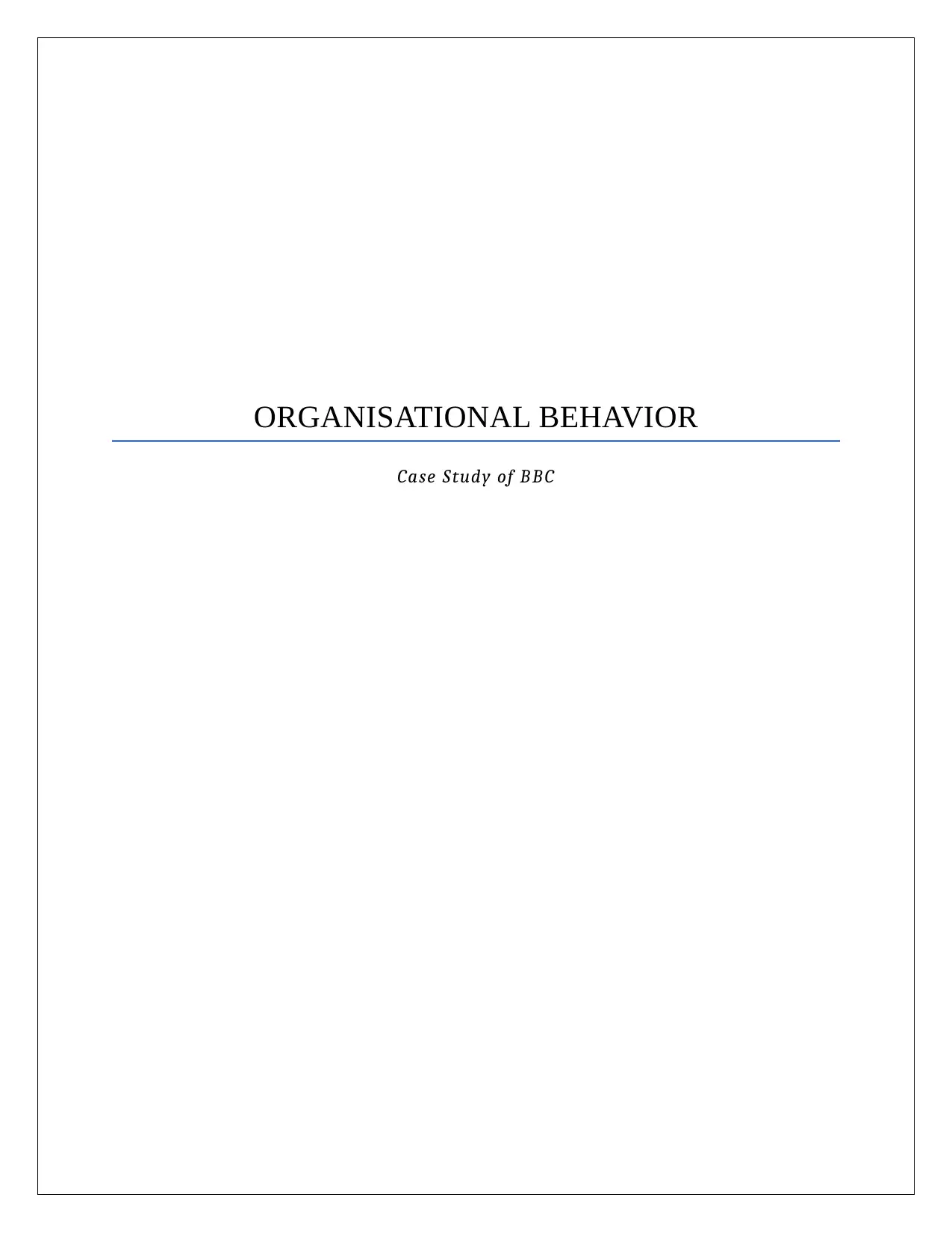
ORGANISATIONAL BEHAVIOR
Case Study of BBC
Case Study of BBC
Paraphrase This Document
Need a fresh take? Get an instant paraphrase of this document with our AI Paraphraser
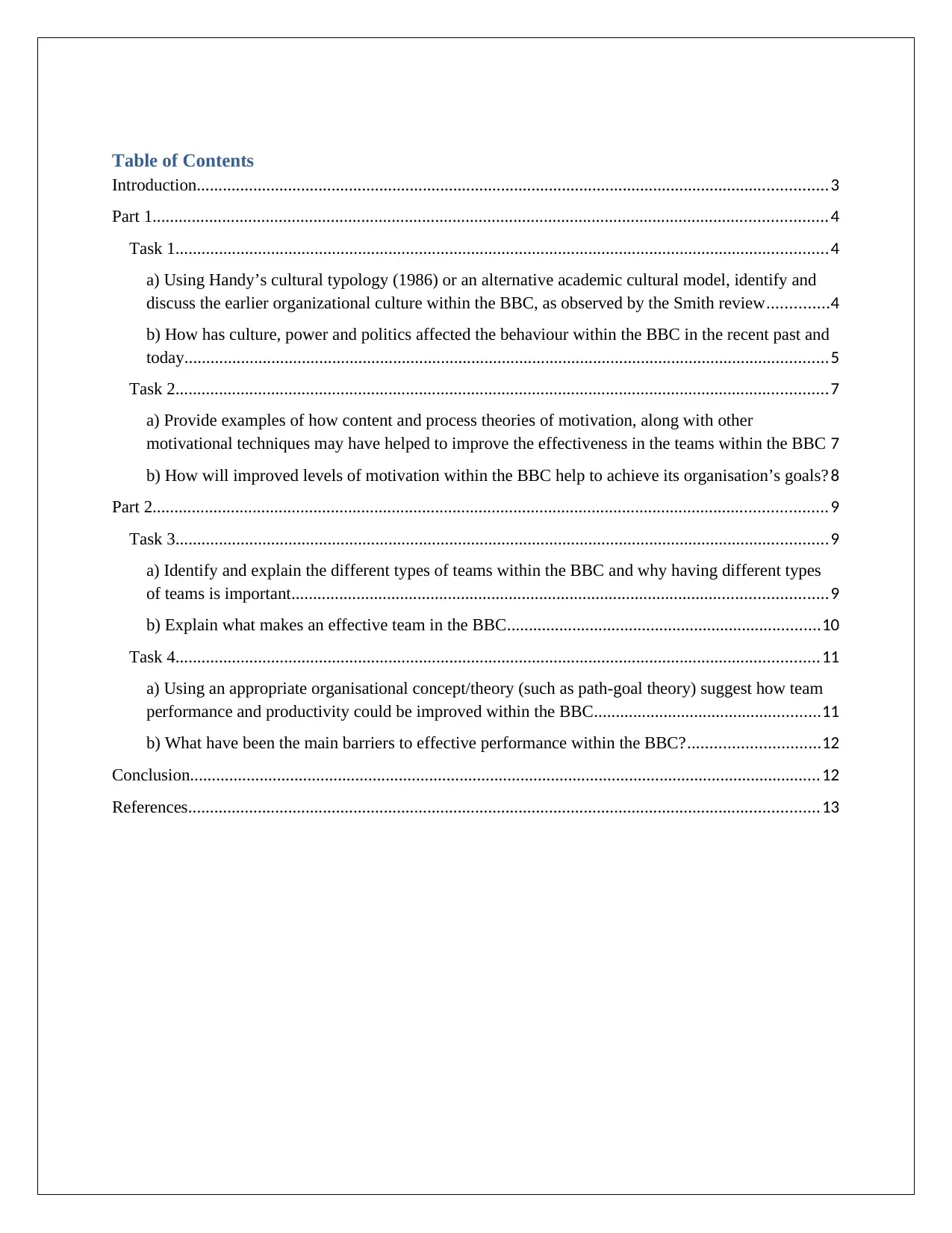
Table of Contents
Introduction.................................................................................................................................................3
Part 1...........................................................................................................................................................4
Task 1......................................................................................................................................................4
a) Using Handy’s cultural typology (1986) or an alternative academic cultural model, identify and
discuss the earlier organizational culture within the BBC, as observed by the Smith review..............4
b) How has culture, power and politics affected the behaviour within the BBC in the recent past and
today....................................................................................................................................................5
Task 2......................................................................................................................................................7
a) Provide examples of how content and process theories of motivation, along with other
motivational techniques may have helped to improve the effectiveness in the teams within the BBC 7
b) How will improved levels of motivation within the BBC help to achieve its organisation’s goals? 8
Part 2...........................................................................................................................................................9
Task 3......................................................................................................................................................9
a) Identify and explain the different types of teams within the BBC and why having different types
of teams is important...........................................................................................................................9
b) Explain what makes an effective team in the BBC........................................................................10
Task 4....................................................................................................................................................11
a) Using an appropriate organisational concept/theory (such as path-goal theory) suggest how team
performance and productivity could be improved within the BBC....................................................11
b) What have been the main barriers to effective performance within the BBC?..............................12
Conclusion.................................................................................................................................................12
References.................................................................................................................................................13
Introduction.................................................................................................................................................3
Part 1...........................................................................................................................................................4
Task 1......................................................................................................................................................4
a) Using Handy’s cultural typology (1986) or an alternative academic cultural model, identify and
discuss the earlier organizational culture within the BBC, as observed by the Smith review..............4
b) How has culture, power and politics affected the behaviour within the BBC in the recent past and
today....................................................................................................................................................5
Task 2......................................................................................................................................................7
a) Provide examples of how content and process theories of motivation, along with other
motivational techniques may have helped to improve the effectiveness in the teams within the BBC 7
b) How will improved levels of motivation within the BBC help to achieve its organisation’s goals? 8
Part 2...........................................................................................................................................................9
Task 3......................................................................................................................................................9
a) Identify and explain the different types of teams within the BBC and why having different types
of teams is important...........................................................................................................................9
b) Explain what makes an effective team in the BBC........................................................................10
Task 4....................................................................................................................................................11
a) Using an appropriate organisational concept/theory (such as path-goal theory) suggest how team
performance and productivity could be improved within the BBC....................................................11
b) What have been the main barriers to effective performance within the BBC?..............................12
Conclusion.................................................................................................................................................12
References.................................................................................................................................................13
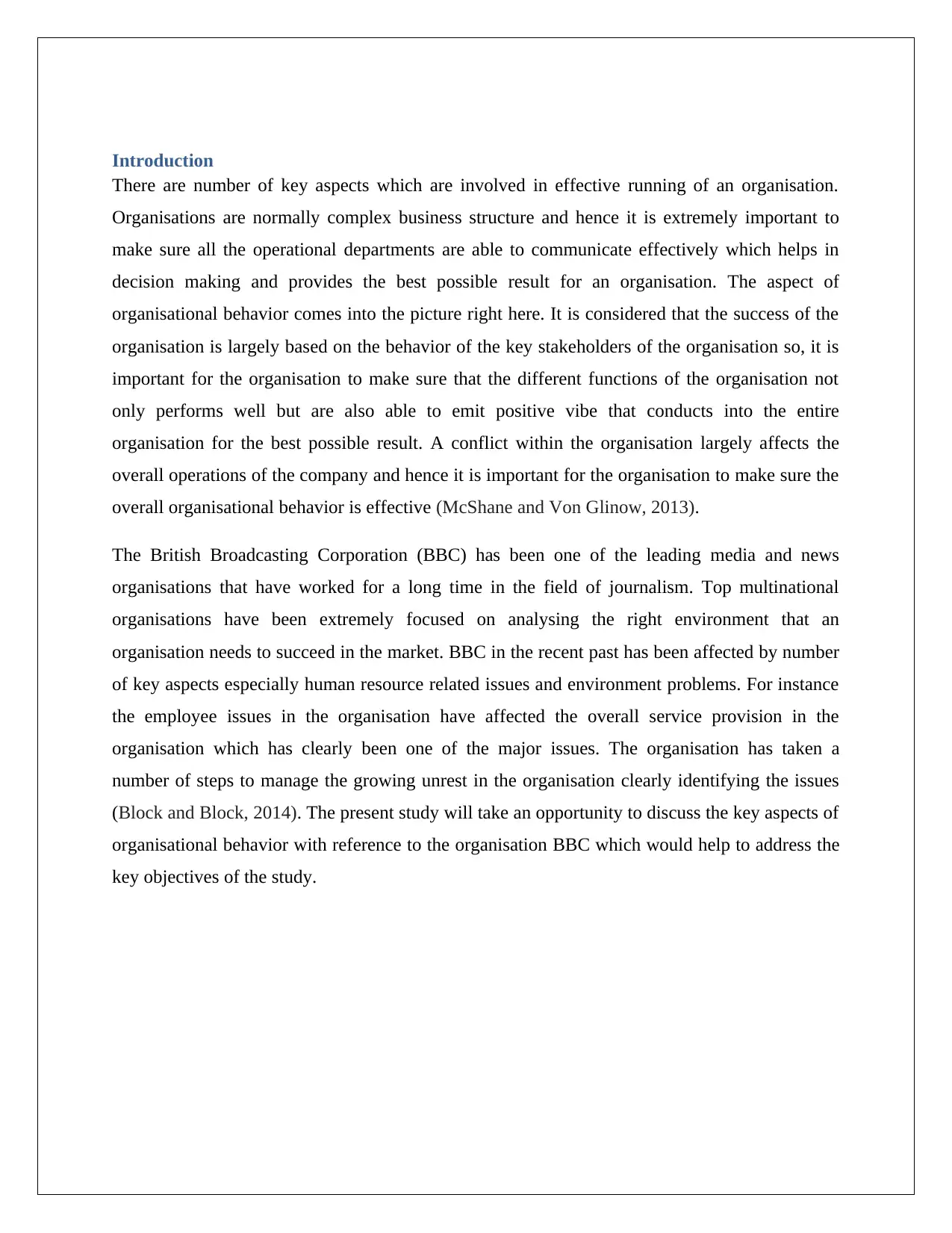
Introduction
There are number of key aspects which are involved in effective running of an organisation.
Organisations are normally complex business structure and hence it is extremely important to
make sure all the operational departments are able to communicate effectively which helps in
decision making and provides the best possible result for an organisation. The aspect of
organisational behavior comes into the picture right here. It is considered that the success of the
organisation is largely based on the behavior of the key stakeholders of the organisation so, it is
important for the organisation to make sure that the different functions of the organisation not
only performs well but are also able to emit positive vibe that conducts into the entire
organisation for the best possible result. A conflict within the organisation largely affects the
overall operations of the company and hence it is important for the organisation to make sure the
overall organisational behavior is effective (McShane and Von Glinow, 2013).
The British Broadcasting Corporation (BBC) has been one of the leading media and news
organisations that have worked for a long time in the field of journalism. Top multinational
organisations have been extremely focused on analysing the right environment that an
organisation needs to succeed in the market. BBC in the recent past has been affected by number
of key aspects especially human resource related issues and environment problems. For instance
the employee issues in the organisation have affected the overall service provision in the
organisation which has clearly been one of the major issues. The organisation has taken a
number of steps to manage the growing unrest in the organisation clearly identifying the issues
(Block and Block, 2014). The present study will take an opportunity to discuss the key aspects of
organisational behavior with reference to the organisation BBC which would help to address the
key objectives of the study.
There are number of key aspects which are involved in effective running of an organisation.
Organisations are normally complex business structure and hence it is extremely important to
make sure all the operational departments are able to communicate effectively which helps in
decision making and provides the best possible result for an organisation. The aspect of
organisational behavior comes into the picture right here. It is considered that the success of the
organisation is largely based on the behavior of the key stakeholders of the organisation so, it is
important for the organisation to make sure that the different functions of the organisation not
only performs well but are also able to emit positive vibe that conducts into the entire
organisation for the best possible result. A conflict within the organisation largely affects the
overall operations of the company and hence it is important for the organisation to make sure the
overall organisational behavior is effective (McShane and Von Glinow, 2013).
The British Broadcasting Corporation (BBC) has been one of the leading media and news
organisations that have worked for a long time in the field of journalism. Top multinational
organisations have been extremely focused on analysing the right environment that an
organisation needs to succeed in the market. BBC in the recent past has been affected by number
of key aspects especially human resource related issues and environment problems. For instance
the employee issues in the organisation have affected the overall service provision in the
organisation which has clearly been one of the major issues. The organisation has taken a
number of steps to manage the growing unrest in the organisation clearly identifying the issues
(Block and Block, 2014). The present study will take an opportunity to discuss the key aspects of
organisational behavior with reference to the organisation BBC which would help to address the
key objectives of the study.
⊘ This is a preview!⊘
Do you want full access?
Subscribe today to unlock all pages.

Trusted by 1+ million students worldwide
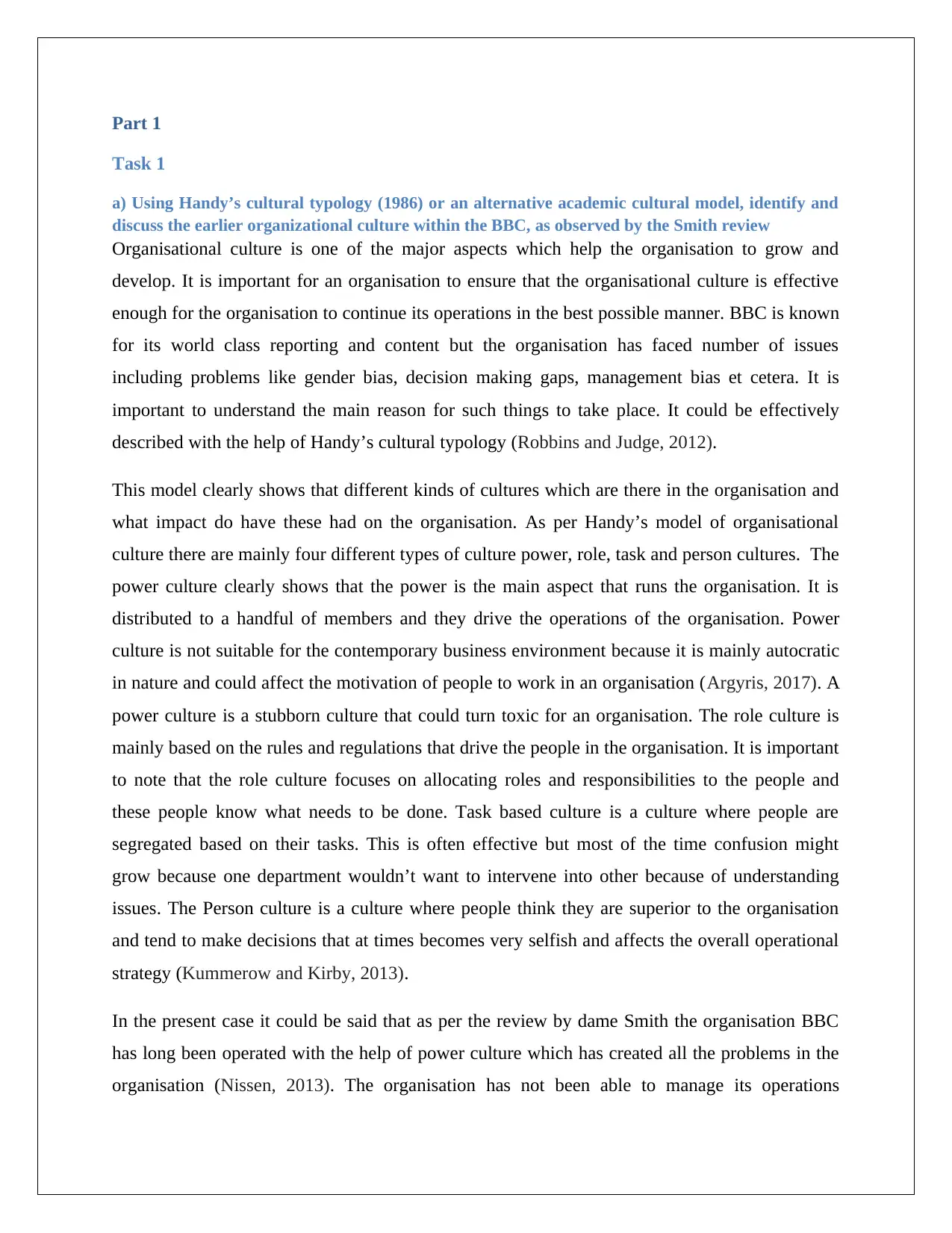
Part 1
Task 1
a) Using Handy’s cultural typology (1986) or an alternative academic cultural model, identify and
discuss the earlier organizational culture within the BBC, as observed by the Smith review
Organisational culture is one of the major aspects which help the organisation to grow and
develop. It is important for an organisation to ensure that the organisational culture is effective
enough for the organisation to continue its operations in the best possible manner. BBC is known
for its world class reporting and content but the organisation has faced number of issues
including problems like gender bias, decision making gaps, management bias et cetera. It is
important to understand the main reason for such things to take place. It could be effectively
described with the help of Handy’s cultural typology (Robbins and Judge, 2012).
This model clearly shows that different kinds of cultures which are there in the organisation and
what impact do have these had on the organisation. As per Handy’s model of organisational
culture there are mainly four different types of culture power, role, task and person cultures. The
power culture clearly shows that the power is the main aspect that runs the organisation. It is
distributed to a handful of members and they drive the operations of the organisation. Power
culture is not suitable for the contemporary business environment because it is mainly autocratic
in nature and could affect the motivation of people to work in an organisation (Argyris, 2017). A
power culture is a stubborn culture that could turn toxic for an organisation. The role culture is
mainly based on the rules and regulations that drive the people in the organisation. It is important
to note that the role culture focuses on allocating roles and responsibilities to the people and
these people know what needs to be done. Task based culture is a culture where people are
segregated based on their tasks. This is often effective but most of the time confusion might
grow because one department wouldn’t want to intervene into other because of understanding
issues. The Person culture is a culture where people think they are superior to the organisation
and tend to make decisions that at times becomes very selfish and affects the overall operational
strategy (Kummerow and Kirby, 2013).
In the present case it could be said that as per the review by dame Smith the organisation BBC
has long been operated with the help of power culture which has created all the problems in the
organisation (Nissen, 2013). The organisation has not been able to manage its operations
Task 1
a) Using Handy’s cultural typology (1986) or an alternative academic cultural model, identify and
discuss the earlier organizational culture within the BBC, as observed by the Smith review
Organisational culture is one of the major aspects which help the organisation to grow and
develop. It is important for an organisation to ensure that the organisational culture is effective
enough for the organisation to continue its operations in the best possible manner. BBC is known
for its world class reporting and content but the organisation has faced number of issues
including problems like gender bias, decision making gaps, management bias et cetera. It is
important to understand the main reason for such things to take place. It could be effectively
described with the help of Handy’s cultural typology (Robbins and Judge, 2012).
This model clearly shows that different kinds of cultures which are there in the organisation and
what impact do have these had on the organisation. As per Handy’s model of organisational
culture there are mainly four different types of culture power, role, task and person cultures. The
power culture clearly shows that the power is the main aspect that runs the organisation. It is
distributed to a handful of members and they drive the operations of the organisation. Power
culture is not suitable for the contemporary business environment because it is mainly autocratic
in nature and could affect the motivation of people to work in an organisation (Argyris, 2017). A
power culture is a stubborn culture that could turn toxic for an organisation. The role culture is
mainly based on the rules and regulations that drive the people in the organisation. It is important
to note that the role culture focuses on allocating roles and responsibilities to the people and
these people know what needs to be done. Task based culture is a culture where people are
segregated based on their tasks. This is often effective but most of the time confusion might
grow because one department wouldn’t want to intervene into other because of understanding
issues. The Person culture is a culture where people think they are superior to the organisation
and tend to make decisions that at times becomes very selfish and affects the overall operational
strategy (Kummerow and Kirby, 2013).
In the present case it could be said that as per the review by dame Smith the organisation BBC
has long been operated with the help of power culture which has created all the problems in the
organisation (Nissen, 2013). The organisation has not been able to manage its operations
Paraphrase This Document
Need a fresh take? Get an instant paraphrase of this document with our AI Paraphraser
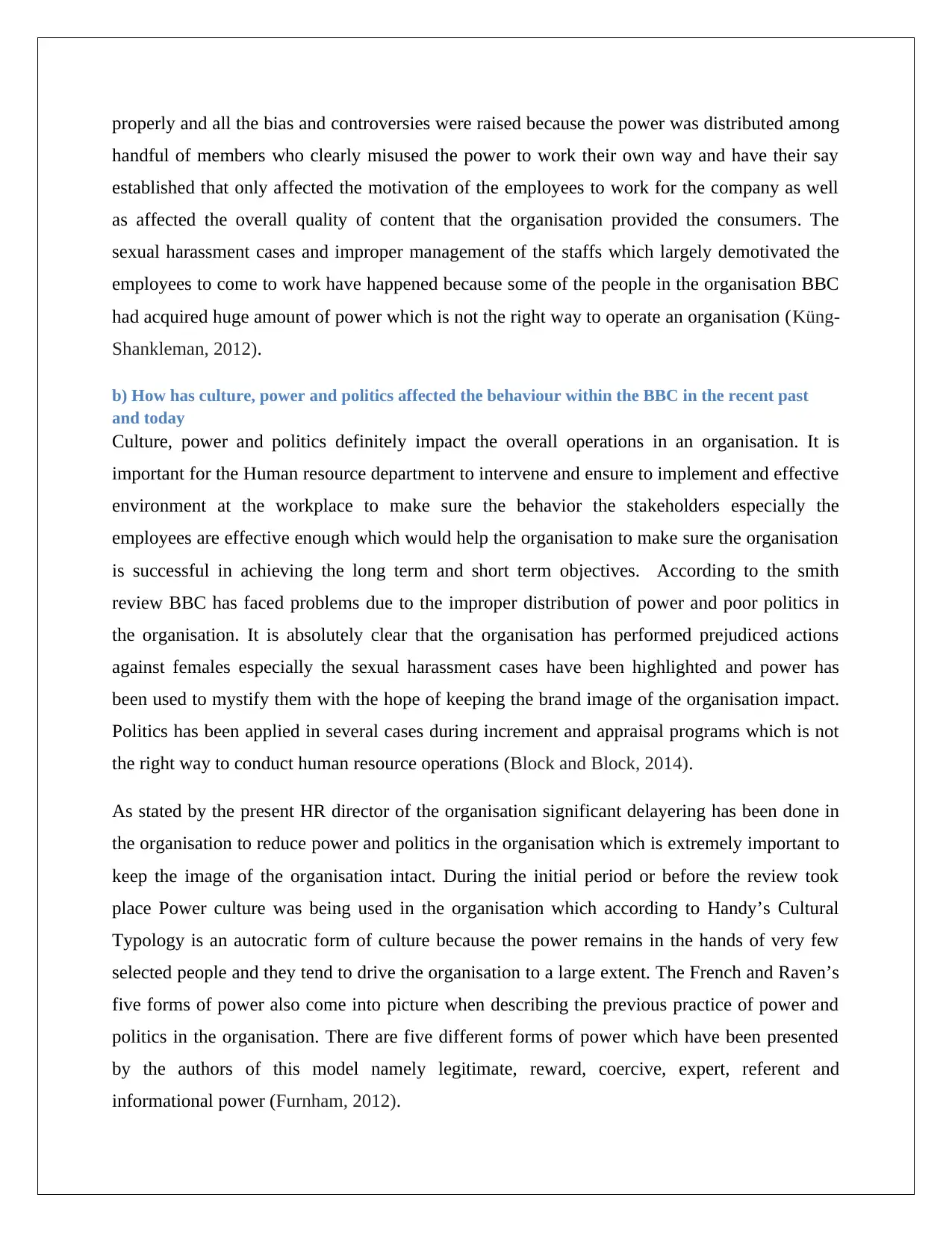
properly and all the bias and controversies were raised because the power was distributed among
handful of members who clearly misused the power to work their own way and have their say
established that only affected the motivation of the employees to work for the company as well
as affected the overall quality of content that the organisation provided the consumers. The
sexual harassment cases and improper management of the staffs which largely demotivated the
employees to come to work have happened because some of the people in the organisation BBC
had acquired huge amount of power which is not the right way to operate an organisation (Küng-
Shankleman, 2012).
b) How has culture, power and politics affected the behaviour within the BBC in the recent past
and today
Culture, power and politics definitely impact the overall operations in an organisation. It is
important for the Human resource department to intervene and ensure to implement and effective
environment at the workplace to make sure the behavior the stakeholders especially the
employees are effective enough which would help the organisation to make sure the organisation
is successful in achieving the long term and short term objectives. According to the smith
review BBC has faced problems due to the improper distribution of power and poor politics in
the organisation. It is absolutely clear that the organisation has performed prejudiced actions
against females especially the sexual harassment cases have been highlighted and power has
been used to mystify them with the hope of keeping the brand image of the organisation impact.
Politics has been applied in several cases during increment and appraisal programs which is not
the right way to conduct human resource operations (Block and Block, 2014).
As stated by the present HR director of the organisation significant delayering has been done in
the organisation to reduce power and politics in the organisation which is extremely important to
keep the image of the organisation intact. During the initial period or before the review took
place Power culture was being used in the organisation which according to Handy’s Cultural
Typology is an autocratic form of culture because the power remains in the hands of very few
selected people and they tend to drive the organisation to a large extent. The French and Raven’s
five forms of power also come into picture when describing the previous practice of power and
politics in the organisation. There are five different forms of power which have been presented
by the authors of this model namely legitimate, reward, coercive, expert, referent and
informational power (Furnham, 2012).
handful of members who clearly misused the power to work their own way and have their say
established that only affected the motivation of the employees to work for the company as well
as affected the overall quality of content that the organisation provided the consumers. The
sexual harassment cases and improper management of the staffs which largely demotivated the
employees to come to work have happened because some of the people in the organisation BBC
had acquired huge amount of power which is not the right way to operate an organisation (Küng-
Shankleman, 2012).
b) How has culture, power and politics affected the behaviour within the BBC in the recent past
and today
Culture, power and politics definitely impact the overall operations in an organisation. It is
important for the Human resource department to intervene and ensure to implement and effective
environment at the workplace to make sure the behavior the stakeholders especially the
employees are effective enough which would help the organisation to make sure the organisation
is successful in achieving the long term and short term objectives. According to the smith
review BBC has faced problems due to the improper distribution of power and poor politics in
the organisation. It is absolutely clear that the organisation has performed prejudiced actions
against females especially the sexual harassment cases have been highlighted and power has
been used to mystify them with the hope of keeping the brand image of the organisation impact.
Politics has been applied in several cases during increment and appraisal programs which is not
the right way to conduct human resource operations (Block and Block, 2014).
As stated by the present HR director of the organisation significant delayering has been done in
the organisation to reduce power and politics in the organisation which is extremely important to
keep the image of the organisation intact. During the initial period or before the review took
place Power culture was being used in the organisation which according to Handy’s Cultural
Typology is an autocratic form of culture because the power remains in the hands of very few
selected people and they tend to drive the organisation to a large extent. The French and Raven’s
five forms of power also come into picture when describing the previous practice of power and
politics in the organisation. There are five different forms of power which have been presented
by the authors of this model namely legitimate, reward, coercive, expert, referent and
informational power (Furnham, 2012).
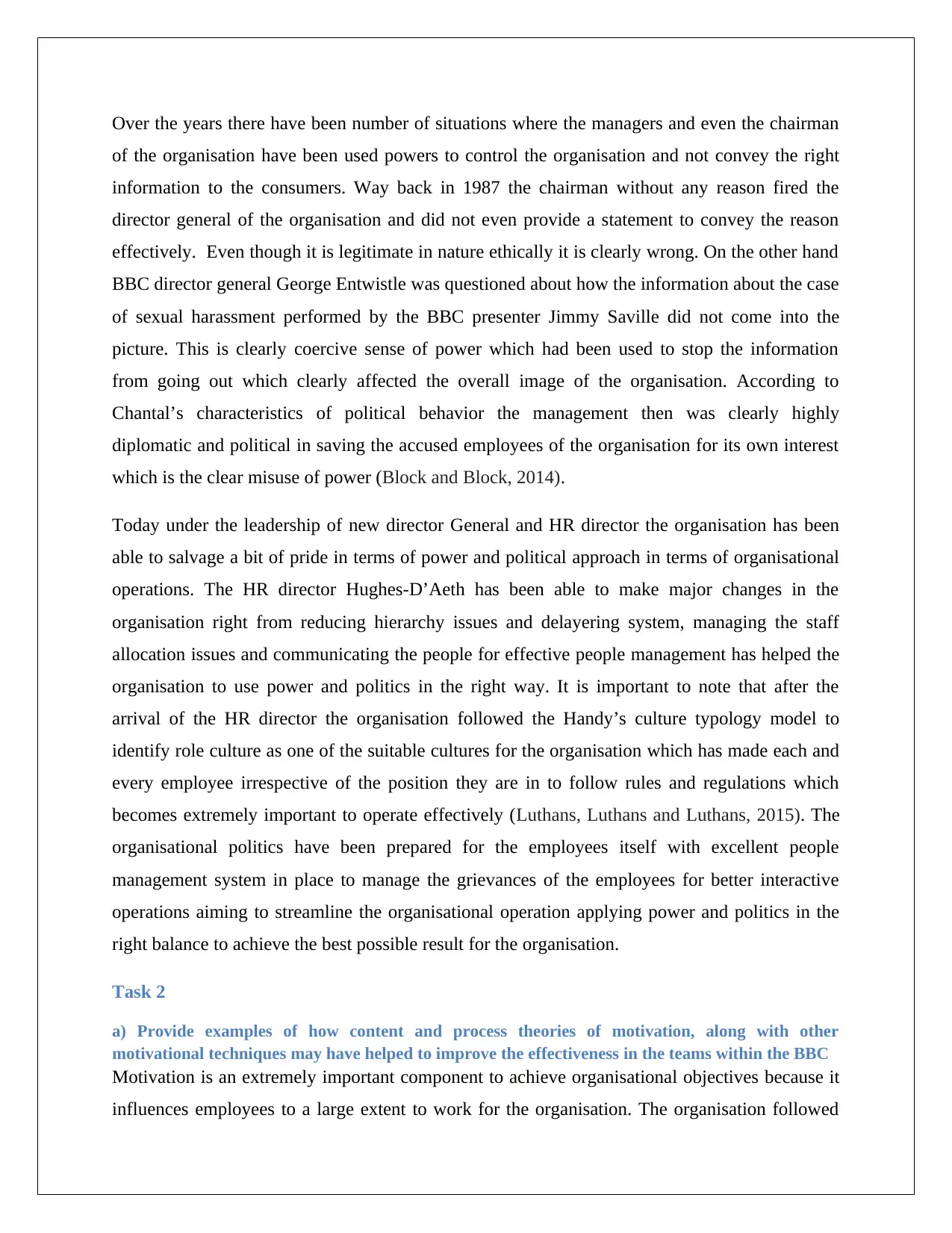
Over the years there have been number of situations where the managers and even the chairman
of the organisation have been used powers to control the organisation and not convey the right
information to the consumers. Way back in 1987 the chairman without any reason fired the
director general of the organisation and did not even provide a statement to convey the reason
effectively. Even though it is legitimate in nature ethically it is clearly wrong. On the other hand
BBC director general George Entwistle was questioned about how the information about the case
of sexual harassment performed by the BBC presenter Jimmy Saville did not come into the
picture. This is clearly coercive sense of power which had been used to stop the information
from going out which clearly affected the overall image of the organisation. According to
Chantal’s characteristics of political behavior the management then was clearly highly
diplomatic and political in saving the accused employees of the organisation for its own interest
which is the clear misuse of power (Block and Block, 2014).
Today under the leadership of new director General and HR director the organisation has been
able to salvage a bit of pride in terms of power and political approach in terms of organisational
operations. The HR director Hughes-D’Aeth has been able to make major changes in the
organisation right from reducing hierarchy issues and delayering system, managing the staff
allocation issues and communicating the people for effective people management has helped the
organisation to use power and politics in the right way. It is important to note that after the
arrival of the HR director the organisation followed the Handy’s culture typology model to
identify role culture as one of the suitable cultures for the organisation which has made each and
every employee irrespective of the position they are in to follow rules and regulations which
becomes extremely important to operate effectively (Luthans, Luthans and Luthans, 2015). The
organisational politics have been prepared for the employees itself with excellent people
management system in place to manage the grievances of the employees for better interactive
operations aiming to streamline the organisational operation applying power and politics in the
right balance to achieve the best possible result for the organisation.
Task 2
a) Provide examples of how content and process theories of motivation, along with other
motivational techniques may have helped to improve the effectiveness in the teams within the BBC
Motivation is an extremely important component to achieve organisational objectives because it
influences employees to a large extent to work for the organisation. The organisation followed
of the organisation have been used powers to control the organisation and not convey the right
information to the consumers. Way back in 1987 the chairman without any reason fired the
director general of the organisation and did not even provide a statement to convey the reason
effectively. Even though it is legitimate in nature ethically it is clearly wrong. On the other hand
BBC director general George Entwistle was questioned about how the information about the case
of sexual harassment performed by the BBC presenter Jimmy Saville did not come into the
picture. This is clearly coercive sense of power which had been used to stop the information
from going out which clearly affected the overall image of the organisation. According to
Chantal’s characteristics of political behavior the management then was clearly highly
diplomatic and political in saving the accused employees of the organisation for its own interest
which is the clear misuse of power (Block and Block, 2014).
Today under the leadership of new director General and HR director the organisation has been
able to salvage a bit of pride in terms of power and political approach in terms of organisational
operations. The HR director Hughes-D’Aeth has been able to make major changes in the
organisation right from reducing hierarchy issues and delayering system, managing the staff
allocation issues and communicating the people for effective people management has helped the
organisation to use power and politics in the right way. It is important to note that after the
arrival of the HR director the organisation followed the Handy’s culture typology model to
identify role culture as one of the suitable cultures for the organisation which has made each and
every employee irrespective of the position they are in to follow rules and regulations which
becomes extremely important to operate effectively (Luthans, Luthans and Luthans, 2015). The
organisational politics have been prepared for the employees itself with excellent people
management system in place to manage the grievances of the employees for better interactive
operations aiming to streamline the organisational operation applying power and politics in the
right balance to achieve the best possible result for the organisation.
Task 2
a) Provide examples of how content and process theories of motivation, along with other
motivational techniques may have helped to improve the effectiveness in the teams within the BBC
Motivation is an extremely important component to achieve organisational objectives because it
influences employees to a large extent to work for the organisation. The organisation followed
⊘ This is a preview!⊘
Do you want full access?
Subscribe today to unlock all pages.

Trusted by 1+ million students worldwide
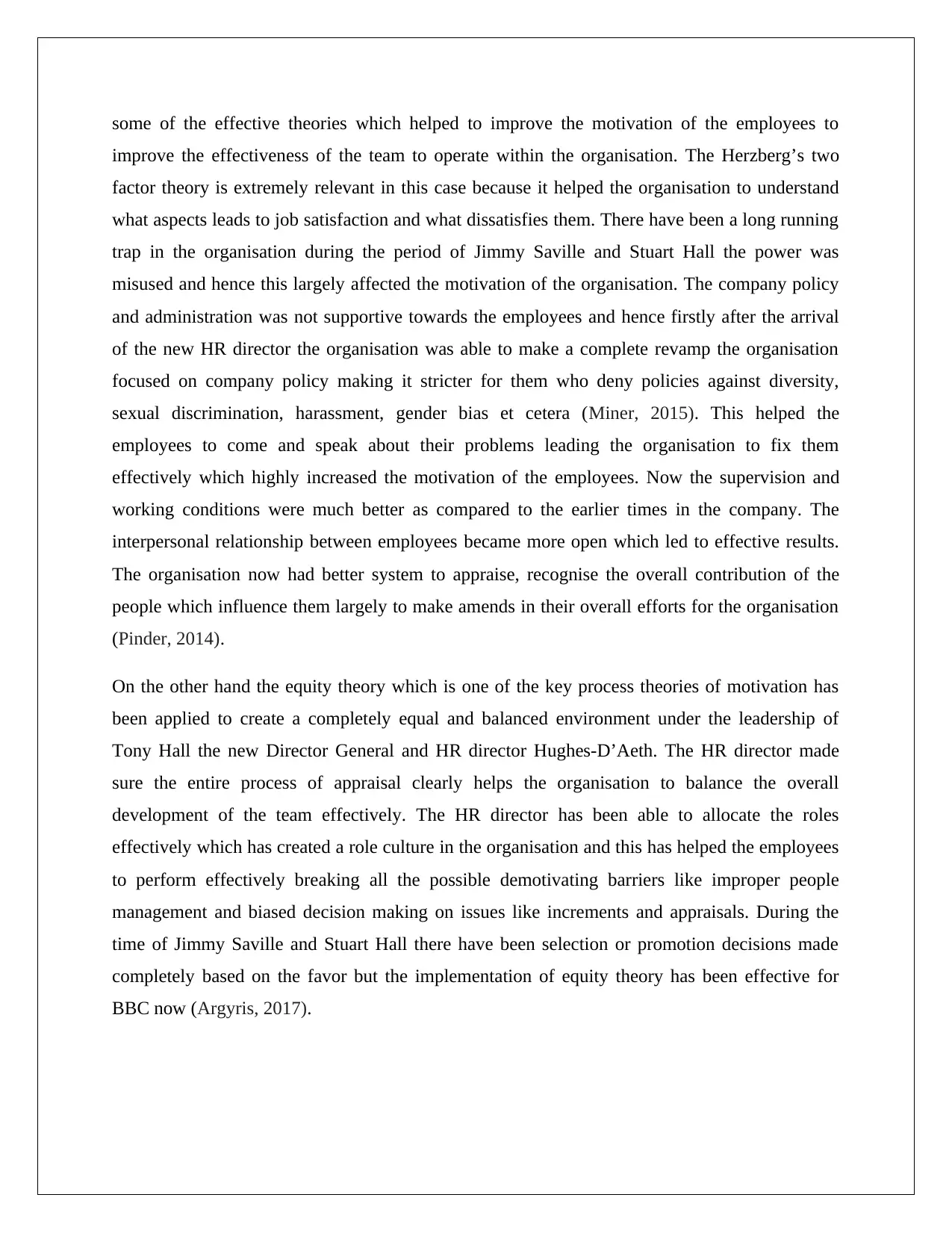
some of the effective theories which helped to improve the motivation of the employees to
improve the effectiveness of the team to operate within the organisation. The Herzberg’s two
factor theory is extremely relevant in this case because it helped the organisation to understand
what aspects leads to job satisfaction and what dissatisfies them. There have been a long running
trap in the organisation during the period of Jimmy Saville and Stuart Hall the power was
misused and hence this largely affected the motivation of the organisation. The company policy
and administration was not supportive towards the employees and hence firstly after the arrival
of the new HR director the organisation was able to make a complete revamp the organisation
focused on company policy making it stricter for them who deny policies against diversity,
sexual discrimination, harassment, gender bias et cetera (Miner, 2015). This helped the
employees to come and speak about their problems leading the organisation to fix them
effectively which highly increased the motivation of the employees. Now the supervision and
working conditions were much better as compared to the earlier times in the company. The
interpersonal relationship between employees became more open which led to effective results.
The organisation now had better system to appraise, recognise the overall contribution of the
people which influence them largely to make amends in their overall efforts for the organisation
(Pinder, 2014).
On the other hand the equity theory which is one of the key process theories of motivation has
been applied to create a completely equal and balanced environment under the leadership of
Tony Hall the new Director General and HR director Hughes-D’Aeth. The HR director made
sure the entire process of appraisal clearly helps the organisation to balance the overall
development of the team effectively. The HR director has been able to allocate the roles
effectively which has created a role culture in the organisation and this has helped the employees
to perform effectively breaking all the possible demotivating barriers like improper people
management and biased decision making on issues like increments and appraisals. During the
time of Jimmy Saville and Stuart Hall there have been selection or promotion decisions made
completely based on the favor but the implementation of equity theory has been effective for
BBC now (Argyris, 2017).
improve the effectiveness of the team to operate within the organisation. The Herzberg’s two
factor theory is extremely relevant in this case because it helped the organisation to understand
what aspects leads to job satisfaction and what dissatisfies them. There have been a long running
trap in the organisation during the period of Jimmy Saville and Stuart Hall the power was
misused and hence this largely affected the motivation of the organisation. The company policy
and administration was not supportive towards the employees and hence firstly after the arrival
of the new HR director the organisation was able to make a complete revamp the organisation
focused on company policy making it stricter for them who deny policies against diversity,
sexual discrimination, harassment, gender bias et cetera (Miner, 2015). This helped the
employees to come and speak about their problems leading the organisation to fix them
effectively which highly increased the motivation of the employees. Now the supervision and
working conditions were much better as compared to the earlier times in the company. The
interpersonal relationship between employees became more open which led to effective results.
The organisation now had better system to appraise, recognise the overall contribution of the
people which influence them largely to make amends in their overall efforts for the organisation
(Pinder, 2014).
On the other hand the equity theory which is one of the key process theories of motivation has
been applied to create a completely equal and balanced environment under the leadership of
Tony Hall the new Director General and HR director Hughes-D’Aeth. The HR director made
sure the entire process of appraisal clearly helps the organisation to balance the overall
development of the team effectively. The HR director has been able to allocate the roles
effectively which has created a role culture in the organisation and this has helped the employees
to perform effectively breaking all the possible demotivating barriers like improper people
management and biased decision making on issues like increments and appraisals. During the
time of Jimmy Saville and Stuart Hall there have been selection or promotion decisions made
completely based on the favor but the implementation of equity theory has been effective for
BBC now (Argyris, 2017).
Paraphrase This Document
Need a fresh take? Get an instant paraphrase of this document with our AI Paraphraser
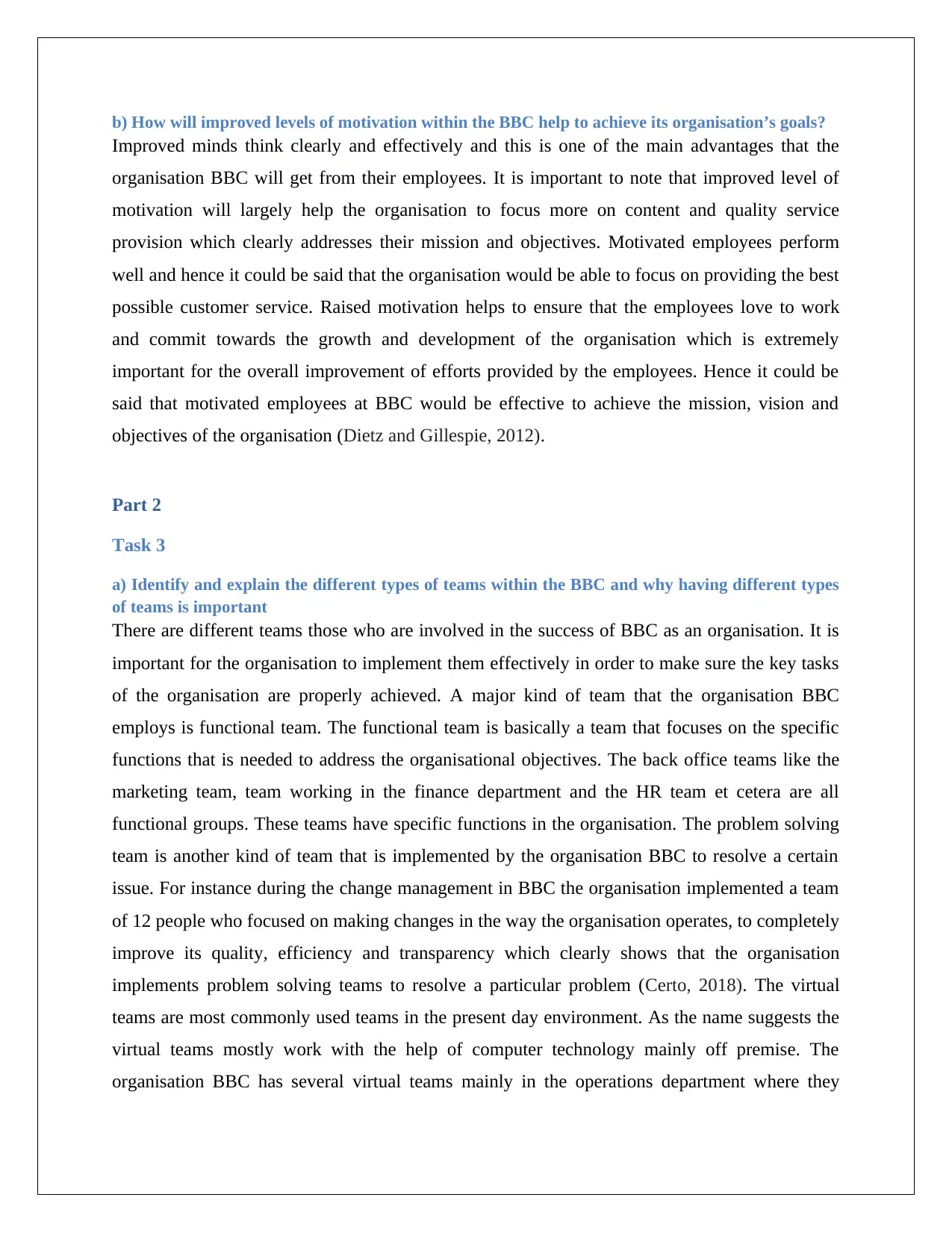
b) How will improved levels of motivation within the BBC help to achieve its organisation’s goals?
Improved minds think clearly and effectively and this is one of the main advantages that the
organisation BBC will get from their employees. It is important to note that improved level of
motivation will largely help the organisation to focus more on content and quality service
provision which clearly addresses their mission and objectives. Motivated employees perform
well and hence it could be said that the organisation would be able to focus on providing the best
possible customer service. Raised motivation helps to ensure that the employees love to work
and commit towards the growth and development of the organisation which is extremely
important for the overall improvement of efforts provided by the employees. Hence it could be
said that motivated employees at BBC would be effective to achieve the mission, vision and
objectives of the organisation (Dietz and Gillespie, 2012).
Part 2
Task 3
a) Identify and explain the different types of teams within the BBC and why having different types
of teams is important
There are different teams those who are involved in the success of BBC as an organisation. It is
important for the organisation to implement them effectively in order to make sure the key tasks
of the organisation are properly achieved. A major kind of team that the organisation BBC
employs is functional team. The functional team is basically a team that focuses on the specific
functions that is needed to address the organisational objectives. The back office teams like the
marketing team, team working in the finance department and the HR team et cetera are all
functional groups. These teams have specific functions in the organisation. The problem solving
team is another kind of team that is implemented by the organisation BBC to resolve a certain
issue. For instance during the change management in BBC the organisation implemented a team
of 12 people who focused on making changes in the way the organisation operates, to completely
improve its quality, efficiency and transparency which clearly shows that the organisation
implements problem solving teams to resolve a particular problem (Certo, 2018). The virtual
teams are most commonly used teams in the present day environment. As the name suggests the
virtual teams mostly work with the help of computer technology mainly off premise. The
organisation BBC has several virtual teams mainly in the operations department where they
Improved minds think clearly and effectively and this is one of the main advantages that the
organisation BBC will get from their employees. It is important to note that improved level of
motivation will largely help the organisation to focus more on content and quality service
provision which clearly addresses their mission and objectives. Motivated employees perform
well and hence it could be said that the organisation would be able to focus on providing the best
possible customer service. Raised motivation helps to ensure that the employees love to work
and commit towards the growth and development of the organisation which is extremely
important for the overall improvement of efforts provided by the employees. Hence it could be
said that motivated employees at BBC would be effective to achieve the mission, vision and
objectives of the organisation (Dietz and Gillespie, 2012).
Part 2
Task 3
a) Identify and explain the different types of teams within the BBC and why having different types
of teams is important
There are different teams those who are involved in the success of BBC as an organisation. It is
important for the organisation to implement them effectively in order to make sure the key tasks
of the organisation are properly achieved. A major kind of team that the organisation BBC
employs is functional team. The functional team is basically a team that focuses on the specific
functions that is needed to address the organisational objectives. The back office teams like the
marketing team, team working in the finance department and the HR team et cetera are all
functional groups. These teams have specific functions in the organisation. The problem solving
team is another kind of team that is implemented by the organisation BBC to resolve a certain
issue. For instance during the change management in BBC the organisation implemented a team
of 12 people who focused on making changes in the way the organisation operates, to completely
improve its quality, efficiency and transparency which clearly shows that the organisation
implements problem solving teams to resolve a particular problem (Certo, 2018). The virtual
teams are most commonly used teams in the present day environment. As the name suggests the
virtual teams mostly work with the help of computer technology mainly off premise. The
organisation BBC has several virtual teams mainly in the operations department where they
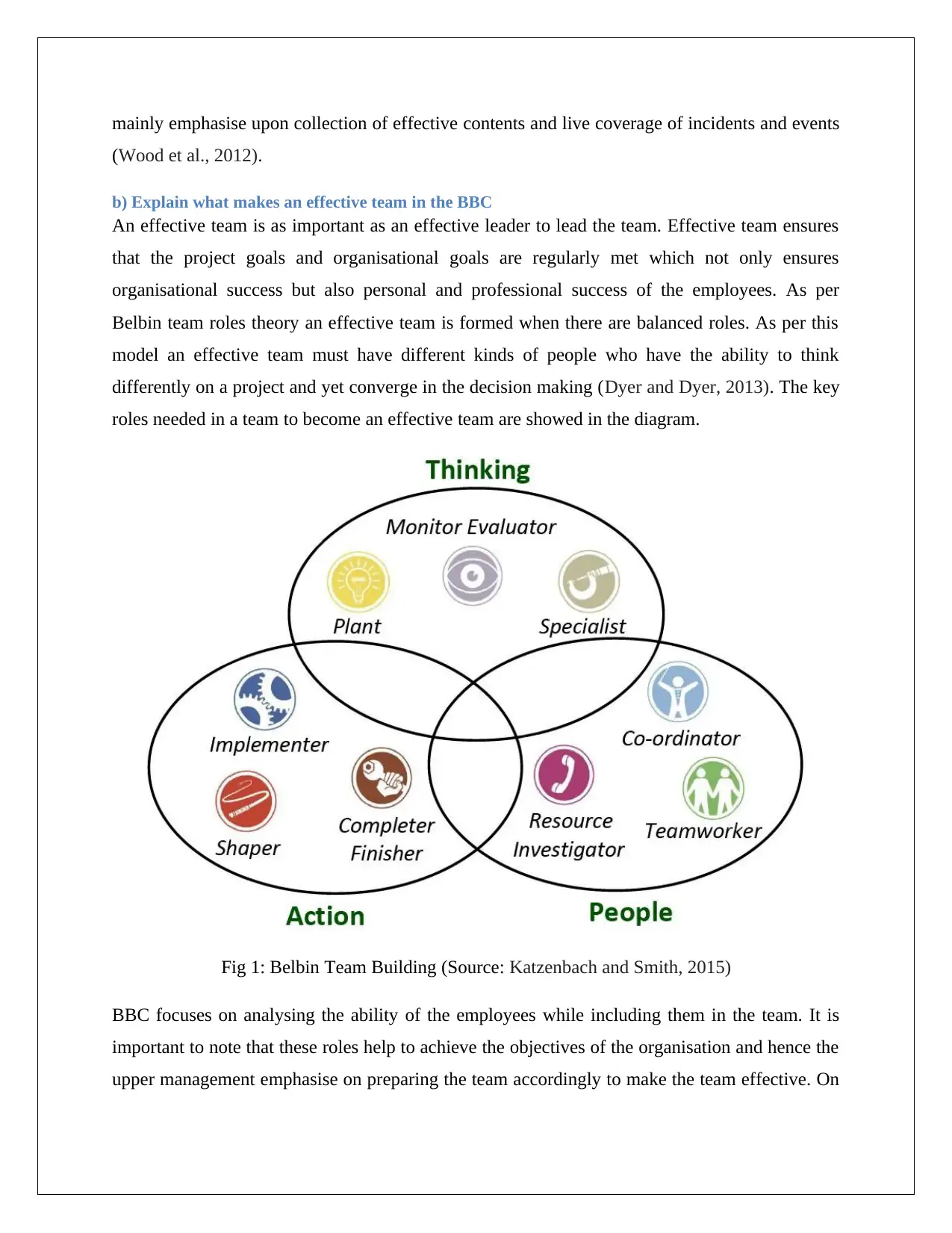
mainly emphasise upon collection of effective contents and live coverage of incidents and events
(Wood et al., 2012).
b) Explain what makes an effective team in the BBC
An effective team is as important as an effective leader to lead the team. Effective team ensures
that the project goals and organisational goals are regularly met which not only ensures
organisational success but also personal and professional success of the employees. As per
Belbin team roles theory an effective team is formed when there are balanced roles. As per this
model an effective team must have different kinds of people who have the ability to think
differently on a project and yet converge in the decision making (Dyer and Dyer, 2013). The key
roles needed in a team to become an effective team are showed in the diagram.
Fig 1: Belbin Team Building (Source: Katzenbach and Smith, 2015)
BBC focuses on analysing the ability of the employees while including them in the team. It is
important to note that these roles help to achieve the objectives of the organisation and hence the
upper management emphasise on preparing the team accordingly to make the team effective. On
(Wood et al., 2012).
b) Explain what makes an effective team in the BBC
An effective team is as important as an effective leader to lead the team. Effective team ensures
that the project goals and organisational goals are regularly met which not only ensures
organisational success but also personal and professional success of the employees. As per
Belbin team roles theory an effective team is formed when there are balanced roles. As per this
model an effective team must have different kinds of people who have the ability to think
differently on a project and yet converge in the decision making (Dyer and Dyer, 2013). The key
roles needed in a team to become an effective team are showed in the diagram.
Fig 1: Belbin Team Building (Source: Katzenbach and Smith, 2015)
BBC focuses on analysing the ability of the employees while including them in the team. It is
important to note that these roles help to achieve the objectives of the organisation and hence the
upper management emphasise on preparing the team accordingly to make the team effective. On
⊘ This is a preview!⊘
Do you want full access?
Subscribe today to unlock all pages.

Trusted by 1+ million students worldwide
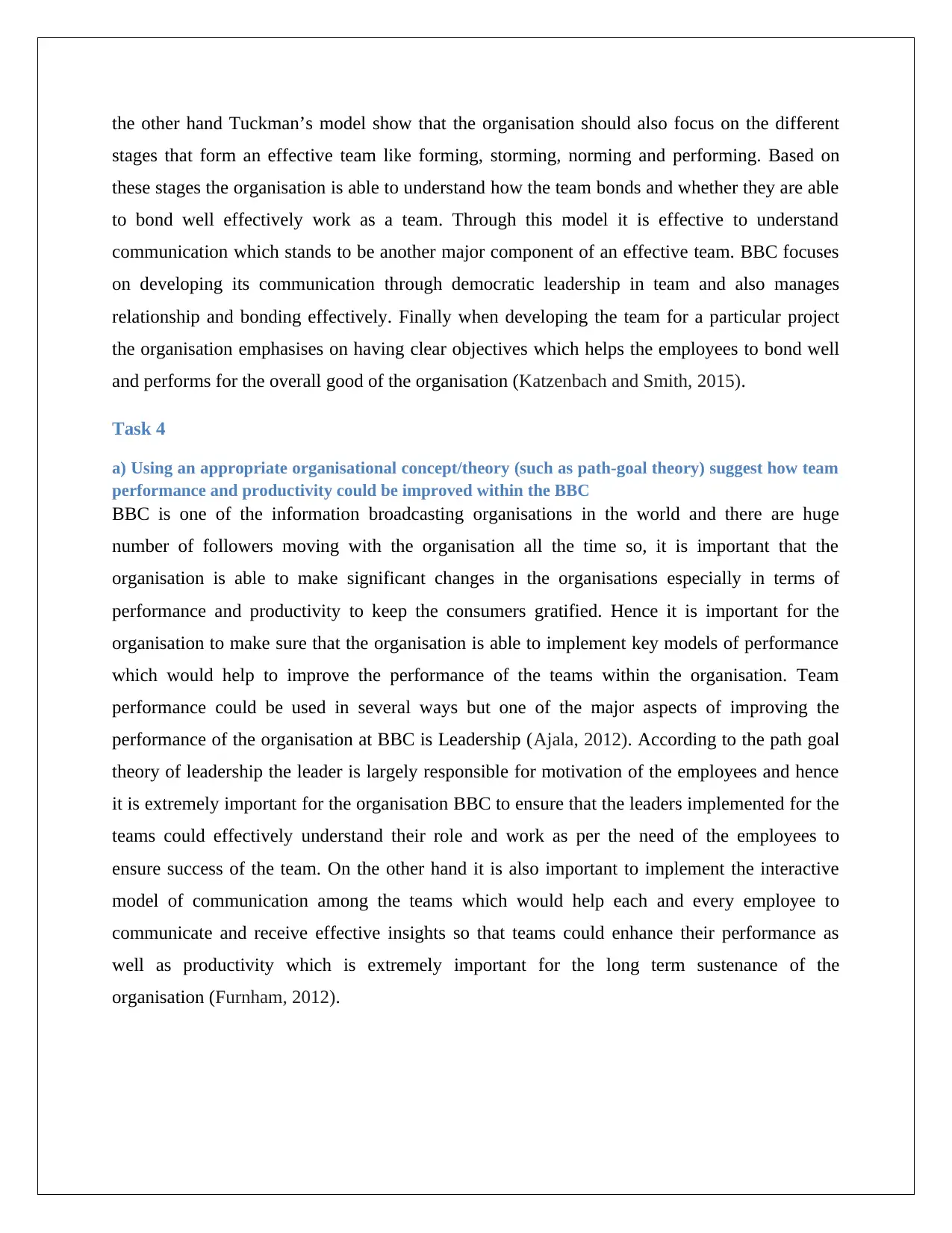
the other hand Tuckman’s model show that the organisation should also focus on the different
stages that form an effective team like forming, storming, norming and performing. Based on
these stages the organisation is able to understand how the team bonds and whether they are able
to bond well effectively work as a team. Through this model it is effective to understand
communication which stands to be another major component of an effective team. BBC focuses
on developing its communication through democratic leadership in team and also manages
relationship and bonding effectively. Finally when developing the team for a particular project
the organisation emphasises on having clear objectives which helps the employees to bond well
and performs for the overall good of the organisation (Katzenbach and Smith, 2015).
Task 4
a) Using an appropriate organisational concept/theory (such as path-goal theory) suggest how team
performance and productivity could be improved within the BBC
BBC is one of the information broadcasting organisations in the world and there are huge
number of followers moving with the organisation all the time so, it is important that the
organisation is able to make significant changes in the organisations especially in terms of
performance and productivity to keep the consumers gratified. Hence it is important for the
organisation to make sure that the organisation is able to implement key models of performance
which would help to improve the performance of the teams within the organisation. Team
performance could be used in several ways but one of the major aspects of improving the
performance of the organisation at BBC is Leadership (Ajala, 2012). According to the path goal
theory of leadership the leader is largely responsible for motivation of the employees and hence
it is extremely important for the organisation BBC to ensure that the leaders implemented for the
teams could effectively understand their role and work as per the need of the employees to
ensure success of the team. On the other hand it is also important to implement the interactive
model of communication among the teams which would help each and every employee to
communicate and receive effective insights so that teams could enhance their performance as
well as productivity which is extremely important for the long term sustenance of the
organisation (Furnham, 2012).
stages that form an effective team like forming, storming, norming and performing. Based on
these stages the organisation is able to understand how the team bonds and whether they are able
to bond well effectively work as a team. Through this model it is effective to understand
communication which stands to be another major component of an effective team. BBC focuses
on developing its communication through democratic leadership in team and also manages
relationship and bonding effectively. Finally when developing the team for a particular project
the organisation emphasises on having clear objectives which helps the employees to bond well
and performs for the overall good of the organisation (Katzenbach and Smith, 2015).
Task 4
a) Using an appropriate organisational concept/theory (such as path-goal theory) suggest how team
performance and productivity could be improved within the BBC
BBC is one of the information broadcasting organisations in the world and there are huge
number of followers moving with the organisation all the time so, it is important that the
organisation is able to make significant changes in the organisations especially in terms of
performance and productivity to keep the consumers gratified. Hence it is important for the
organisation to make sure that the organisation is able to implement key models of performance
which would help to improve the performance of the teams within the organisation. Team
performance could be used in several ways but one of the major aspects of improving the
performance of the organisation at BBC is Leadership (Ajala, 2012). According to the path goal
theory of leadership the leader is largely responsible for motivation of the employees and hence
it is extremely important for the organisation BBC to ensure that the leaders implemented for the
teams could effectively understand their role and work as per the need of the employees to
ensure success of the team. On the other hand it is also important to implement the interactive
model of communication among the teams which would help each and every employee to
communicate and receive effective insights so that teams could enhance their performance as
well as productivity which is extremely important for the long term sustenance of the
organisation (Furnham, 2012).
Paraphrase This Document
Need a fresh take? Get an instant paraphrase of this document with our AI Paraphraser
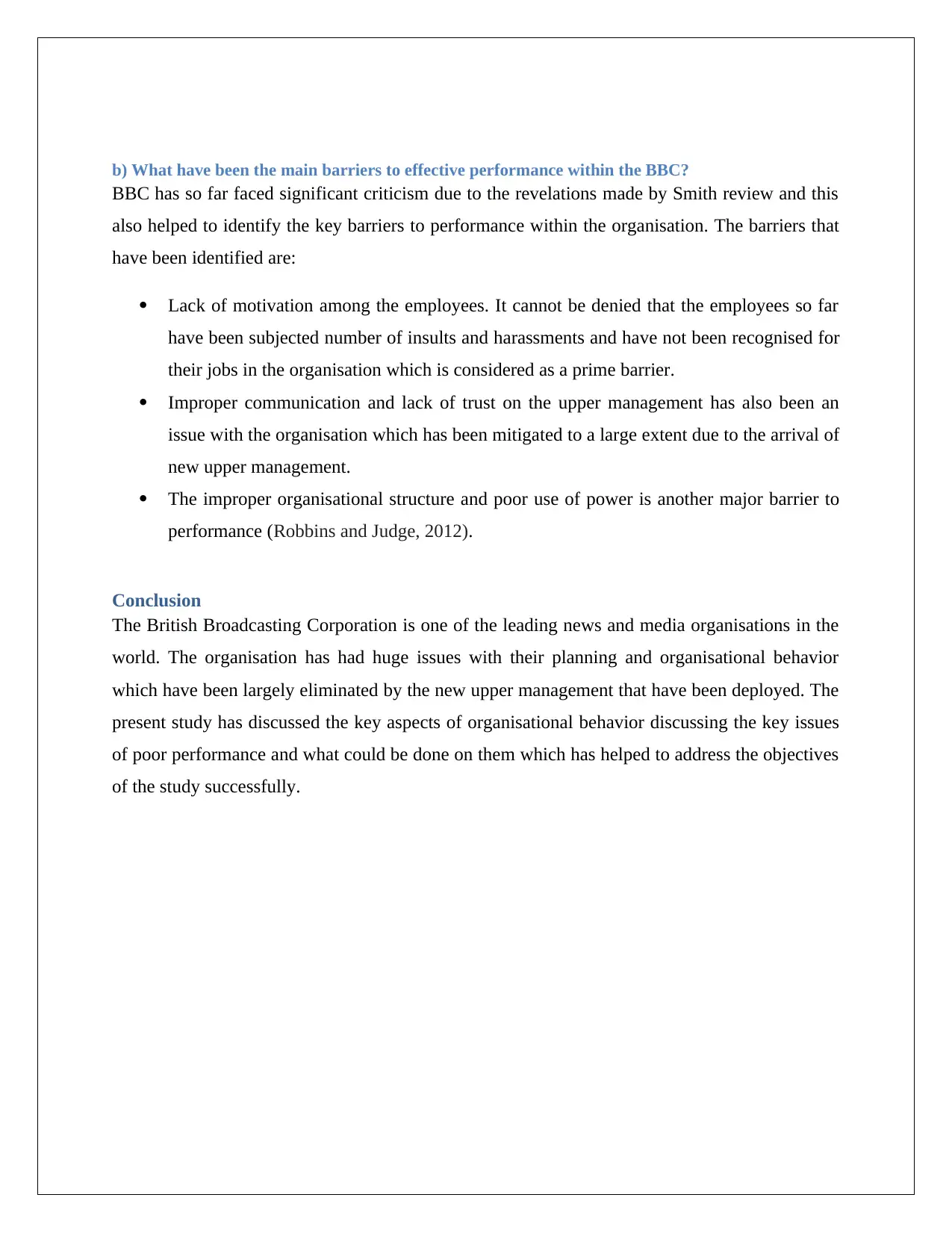
b) What have been the main barriers to effective performance within the BBC?
BBC has so far faced significant criticism due to the revelations made by Smith review and this
also helped to identify the key barriers to performance within the organisation. The barriers that
have been identified are:
Lack of motivation among the employees. It cannot be denied that the employees so far
have been subjected number of insults and harassments and have not been recognised for
their jobs in the organisation which is considered as a prime barrier.
Improper communication and lack of trust on the upper management has also been an
issue with the organisation which has been mitigated to a large extent due to the arrival of
new upper management.
The improper organisational structure and poor use of power is another major barrier to
performance (Robbins and Judge, 2012).
Conclusion
The British Broadcasting Corporation is one of the leading news and media organisations in the
world. The organisation has had huge issues with their planning and organisational behavior
which have been largely eliminated by the new upper management that have been deployed. The
present study has discussed the key aspects of organisational behavior discussing the key issues
of poor performance and what could be done on them which has helped to address the objectives
of the study successfully.
BBC has so far faced significant criticism due to the revelations made by Smith review and this
also helped to identify the key barriers to performance within the organisation. The barriers that
have been identified are:
Lack of motivation among the employees. It cannot be denied that the employees so far
have been subjected number of insults and harassments and have not been recognised for
their jobs in the organisation which is considered as a prime barrier.
Improper communication and lack of trust on the upper management has also been an
issue with the organisation which has been mitigated to a large extent due to the arrival of
new upper management.
The improper organisational structure and poor use of power is another major barrier to
performance (Robbins and Judge, 2012).
Conclusion
The British Broadcasting Corporation is one of the leading news and media organisations in the
world. The organisation has had huge issues with their planning and organisational behavior
which have been largely eliminated by the new upper management that have been deployed. The
present study has discussed the key aspects of organisational behavior discussing the key issues
of poor performance and what could be done on them which has helped to address the objectives
of the study successfully.
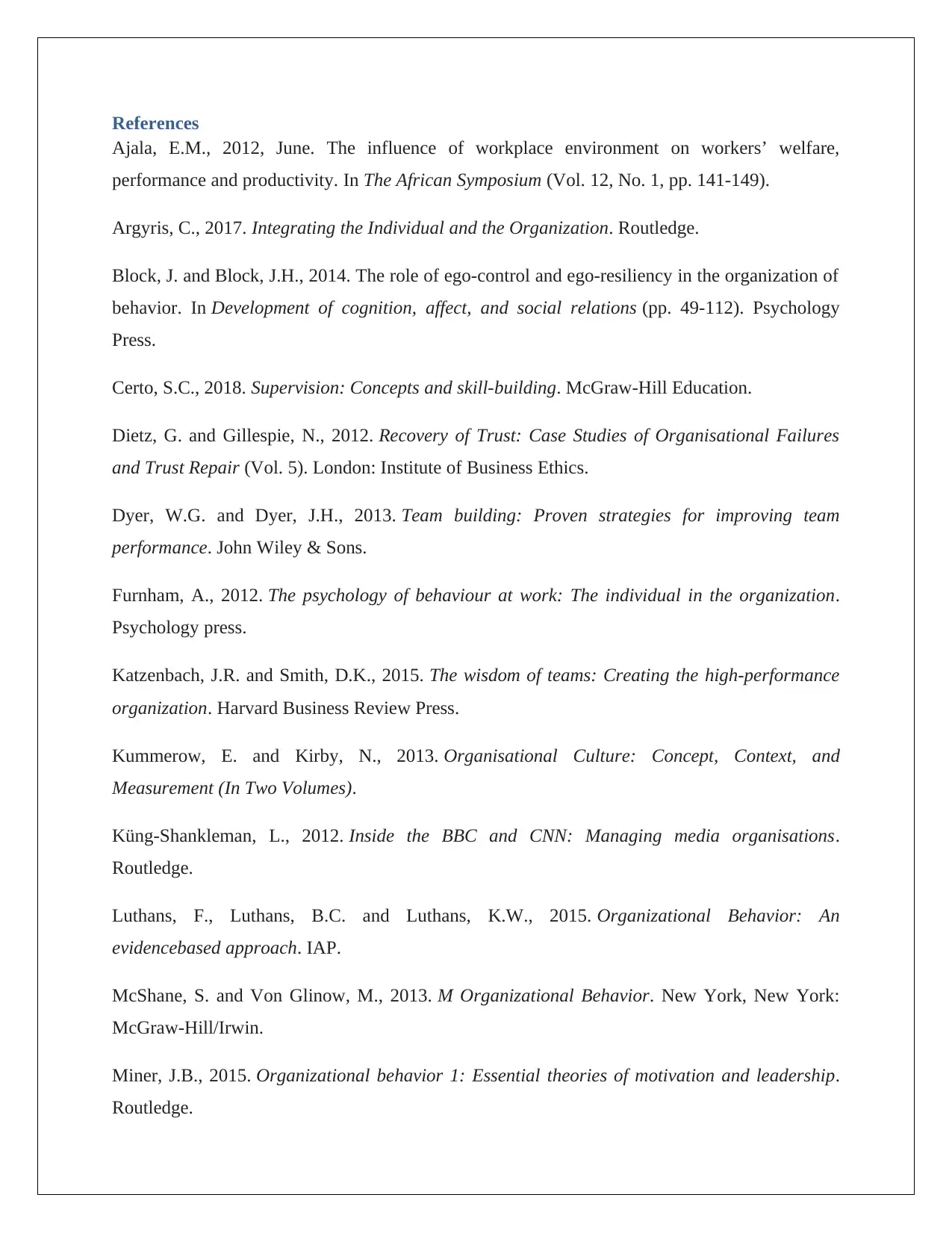
References
Ajala, E.M., 2012, June. The influence of workplace environment on workers’ welfare,
performance and productivity. In The African Symposium (Vol. 12, No. 1, pp. 141-149).
Argyris, C., 2017. Integrating the Individual and the Organization. Routledge.
Block, J. and Block, J.H., 2014. The role of ego-control and ego-resiliency in the organization of
behavior. In Development of cognition, affect, and social relations (pp. 49-112). Psychology
Press.
Certo, S.C., 2018. Supervision: Concepts and skill-building. McGraw-Hill Education.
Dietz, G. and Gillespie, N., 2012. Recovery of Trust: Case Studies of Organisational Failures
and Trust Repair (Vol. 5). London: Institute of Business Ethics.
Dyer, W.G. and Dyer, J.H., 2013. Team building: Proven strategies for improving team
performance. John Wiley & Sons.
Furnham, A., 2012. The psychology of behaviour at work: The individual in the organization.
Psychology press.
Katzenbach, J.R. and Smith, D.K., 2015. The wisdom of teams: Creating the high-performance
organization. Harvard Business Review Press.
Kummerow, E. and Kirby, N., 2013. Organisational Culture: Concept, Context, and
Measurement (In Two Volumes).
Küng-Shankleman, L., 2012. Inside the BBC and CNN: Managing media organisations.
Routledge.
Luthans, F., Luthans, B.C. and Luthans, K.W., 2015. Organizational Behavior: An
evidencebased approach. IAP.
McShane, S. and Von Glinow, M., 2013. M Organizational Behavior. New York, New York:
McGraw-Hill/Irwin.
Miner, J.B., 2015. Organizational behavior 1: Essential theories of motivation and leadership.
Routledge.
Ajala, E.M., 2012, June. The influence of workplace environment on workers’ welfare,
performance and productivity. In The African Symposium (Vol. 12, No. 1, pp. 141-149).
Argyris, C., 2017. Integrating the Individual and the Organization. Routledge.
Block, J. and Block, J.H., 2014. The role of ego-control and ego-resiliency in the organization of
behavior. In Development of cognition, affect, and social relations (pp. 49-112). Psychology
Press.
Certo, S.C., 2018. Supervision: Concepts and skill-building. McGraw-Hill Education.
Dietz, G. and Gillespie, N., 2012. Recovery of Trust: Case Studies of Organisational Failures
and Trust Repair (Vol. 5). London: Institute of Business Ethics.
Dyer, W.G. and Dyer, J.H., 2013. Team building: Proven strategies for improving team
performance. John Wiley & Sons.
Furnham, A., 2012. The psychology of behaviour at work: The individual in the organization.
Psychology press.
Katzenbach, J.R. and Smith, D.K., 2015. The wisdom of teams: Creating the high-performance
organization. Harvard Business Review Press.
Kummerow, E. and Kirby, N., 2013. Organisational Culture: Concept, Context, and
Measurement (In Two Volumes).
Küng-Shankleman, L., 2012. Inside the BBC and CNN: Managing media organisations.
Routledge.
Luthans, F., Luthans, B.C. and Luthans, K.W., 2015. Organizational Behavior: An
evidencebased approach. IAP.
McShane, S. and Von Glinow, M., 2013. M Organizational Behavior. New York, New York:
McGraw-Hill/Irwin.
Miner, J.B., 2015. Organizational behavior 1: Essential theories of motivation and leadership.
Routledge.
⊘ This is a preview!⊘
Do you want full access?
Subscribe today to unlock all pages.

Trusted by 1+ million students worldwide
1 out of 13
Related Documents
Your All-in-One AI-Powered Toolkit for Academic Success.
+13062052269
info@desklib.com
Available 24*7 on WhatsApp / Email
![[object Object]](/_next/static/media/star-bottom.7253800d.svg)
Unlock your academic potential
Copyright © 2020–2026 A2Z Services. All Rights Reserved. Developed and managed by ZUCOL.




